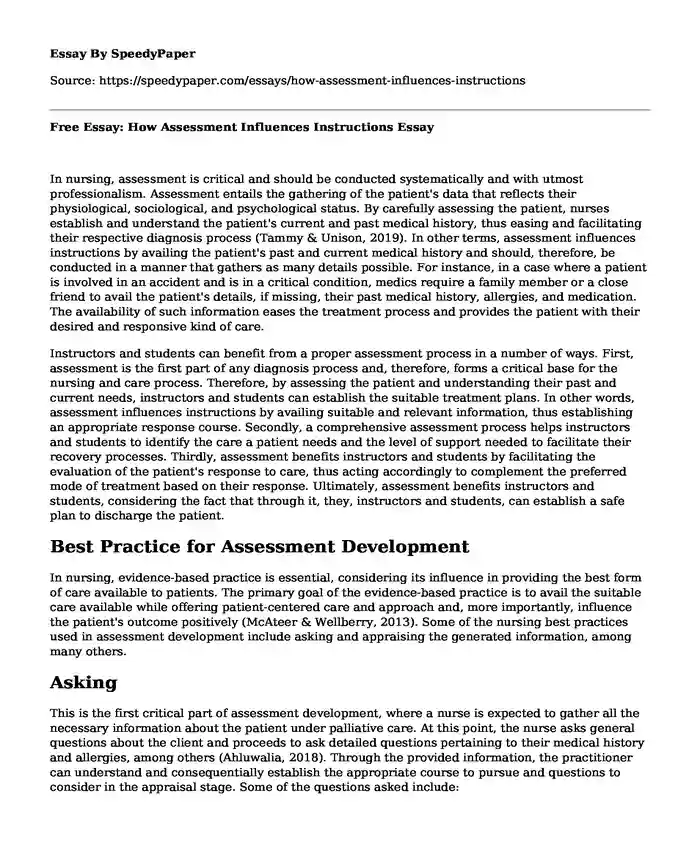
| Type of paper: | Essay |
| Categories: | Analysis Healthcare Nursing care Human services |
| Pages: | 3 |
| Wordcount: | 671 words |
In nursing, assessment is critical and should be conducted systematically and with utmost professionalism. Assessment entails the gathering of the patient's data that reflects their physiological, sociological, and psychological status. By carefully assessing the patient, nurses establish and understand the patient's current and past medical history, thus easing and facilitating their respective diagnosis process (Tammy & Unison, 2019). In other terms, assessment influences instructions by availing the patient's past and current medical history and should, therefore, be conducted in a manner that gathers as many details possible. For instance, in a case where a patient is involved in an accident and is in a critical condition, medics require a family member or a close friend to avail the patient's details, if missing, their past medical history, allergies, and medication. The availability of such information eases the treatment process and provides the patient with their desired and responsive kind of care.
Instructors and students can benefit from a proper assessment process in a number of ways. First, assessment is the first part of any diagnosis process and, therefore, forms a critical base for the nursing and care process. Therefore, by assessing the patient and understanding their past and current needs, instructors and students can establish the suitable treatment plans. In other words, assessment influences instructions by availing suitable and relevant information, thus establishing an appropriate response course. Secondly, a comprehensive assessment process helps instructors and students to identify the care a patient needs and the level of support needed to facilitate their recovery processes. Thirdly, assessment benefits instructors and students by facilitating the evaluation of the patient's response to care, thus acting accordingly to complement the preferred mode of treatment based on their response. Ultimately, assessment benefits instructors and students, considering the fact that through it, they, instructors and students, can establish a safe plan to discharge the patient.
Best Practice for Assessment Development
In nursing, evidence-based practice is essential, considering its influence in providing the best form of care available to patients. The primary goal of the evidence-based practice is to avail the suitable care available while offering patient-centered care and approach and, more importantly, influence the patient's outcome positively (McAteer & Wellberry, 2013). Some of the nursing best practices used in assessment development include asking and appraising the generated information, among many others.
Asking
This is the first critical part of assessment development, where a nurse is expected to gather all the necessary information about the patient under palliative care. At this point, the nurse asks general questions about the client and proceeds to ask detailed questions pertaining to their medical history and allergies, among others (Ahluwalia, 2018). Through the provided information, the practitioner can understand and consequentially establish the appropriate course to pursue and questions to consider in the appraisal stage. Some of the questions asked include:
- What is your name?
- What is your medical record number?
- How old are you?
Appraising
This stage entails the extraction of detailed information about the patient's medical condition. In this stage, nurses enquire more about the patient's condition from their close friends and relatives, thus having an elaborate and a more concise picture and understanding about their situation (Evidence-Based Practice in Health, n.d). Some of the questions asked include:
- How long have you been ailing?
- Are you under medication? If yes, which one?
- Do you experience pain? If yes, where and how severe is it?
Overall, assessment is critical to the nursing practice and should be handled with utmost professionalism to offer the best services to the patients while facilitating the attainment of positive patient outcomes.
References
Ahluwalia, S. (2018). Growing Evidence Supports Best Practices in Palliative Care. Retrieved 20 January 2020, from https://www.rand.org/news/press/2018/10/31/index1.html
Evidence-Based Practice in Health: Introduction. Retrieved 20 January 2020, from https://canberra.libguides.com/evidence
McAteer, R. & Wellbery, C. (2013). Palliative Care: Benefits, Barriers, and Best Practices. Retrieved 20 January 2020, from https://www.aafp.org/afp/2013/1215/p807.html
Toney, T. & Unison, W. (2019). Nursing Admission Assessment and Examination. Retrieved 20 January 2020, from https://www.ncbi.nlm.nih.gov/books/NBK493211/
Cite this page
Free Essay: How Assessment Influences Instructions. (2023, Mar 26). Retrieved from https://speedypaper.com/essays/how-assessment-influences-instructions
Request Removal
If you are the original author of this essay and no longer wish to have it published on the SpeedyPaper website, please click below to request its removal:
- Free Essay on Relating Temporal Cognition to Romanticism and Existentialism
- Technology Essay Sample: Video Streaming Protocol
- Free Essay: Relation of Confidence, Knowledge and Aggression with Leadership
- Essay Example on Tim Cook - Apple Inc.'s CEO
- Movie Review in a Free Essay: Skiptrace by Jackie Chan
- Essay Sample Describing the Case Studies in Nursing Practice
- Free Paper on Hyundai and Its Sales Performance in 2018
Popular categories




